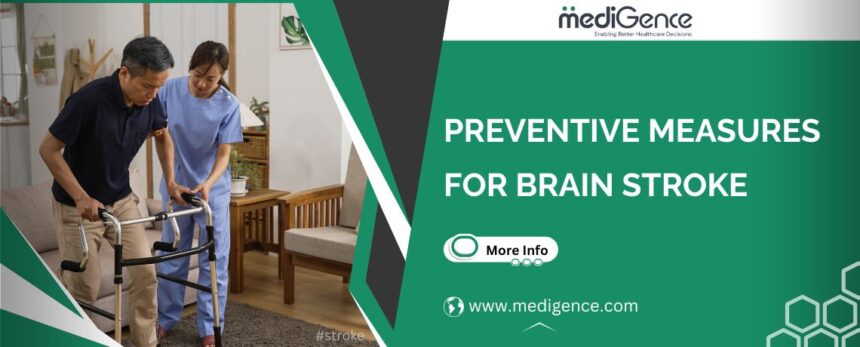How can a brain spill be avoided? Be greater and have a father or another close relative who has experienced a stroke increases our risk of having a elimination.
Although you cannot go back in time or alter your family’s history, you can control many other stroke risk factors if you know what they are. You can take the following actions for lessons of the effects of the stroke:
Select foods and nutritional drinks
Cerebrovascular accident can be avoided by taking healthy foods and refrigery options. Be sure to consume many fresh products. The consumption of fiber and low foods in cholesterol, trans fats and saturated fats can help prevent high cholesterol. Reducing the amount of salt (sodium) in your diet can also help reduce blood pressure.
Keep a healthy weight
Its risk of having a stroke increases due to obesity and its associated complications, such as diabetes and high blood pressure. Doctors frequently calculate their body mass index (BMI) to assess whether their weight falls into a healthy range due to its height and weight.
Its objective: Althegh, a body mass index (BMI) or 25 or lower is ideal, it may not be able to achieve it. Consequently, you can develop a personalized weight loss plan with your doctor.
Regular
Maintaining healthy weight and reducing blood pressure and cholesterol are two benefits of physical activity. General advice to adults is to participate in an aerobic physical activity of moderate intensity, such as a quick walk, for two hours and thirty minutes every week.
Avoid smoking
Your goal is to quit smoking!
Significant smoking increases its risk of stroke. Don’t start if you don’t smoke. Giving up smoking will reduce your risk of stroke if you currently smoke.
How to do it:
Consult your doctor about the best method to stop smoking.
Use smoking tools, such as medications, advice or patches or nicotine pills.
Go ahead. For most smokers, quitting smoking take multiple attempts. Consider all efforts as a step to break the habit.
Restrict alcohol intake
Avoid excessive alcohol consumption, as this can make your blood pressure increase. Women should limit their daily alcohol intake to a drink, while men should limit their daily alcohol intake to two.
Monitor cholesterol levels
At least once every five years, consult your cholesterol levels. Modifications of medicines and lifestyle can help reduce the risk of stroke if you have high cholesterol. Since blood pressure high rarely exhibits any symptoms, it is important to be verified frequently.
Handle diabetes
Your doctor could advise you to test if you think you have diabetes symptoms. Check your blood sugar levels often if you have diabetes. Certain modifications in lifestyle, such as increasing physical activity or making healthier food decisions, are suggestible. The medications, as prescribed by the doctor, to keep their blood sugar inside the recommended range, must be consumed exactly. When taking these steps, you can reduce your risk of stroke and control of Mintain on your blood sugar. Approximately time, the high level of blood sugar damages blood vessels, increasing the risk of forming clots within them.
Maintaining control over your blood sugar is your goal

Get a free online consultation with expert
Request a call return
Address heart conditions
Your medical care team can suggest medications or surgery if you have certain heart conditions, such as coronary artery disease or atrial fibrillation (an irregular beat). The stroke can be avoided treating heart problems.
Take your medications on time
Pay close attention to what your doctor tells you if you take medication for diabetes, high blood pressure, high cholesterol or heart disease. If something is not clear to you, always ask questions and have insurance. Never stop taking your medicine or alter the dose without first consulting your chemist or doctor.
Keep your blood pressure in a healthy range
An important factor that contributes is high blood pressure, which, if not controlled, can duplicate or even quadruple its risk of stroke. The greatest risk factor for stroke both in men and women is high blood pressure. It is very important to monitor its blood pressure and, if it is not in the right range, so that it is.
Obtain more information: Click here
Its objective: maintaining blood pressure below 120/80 is a desirable objective. However, you and your doctor may have valid reasons not to want your readings to be so low. A less demanding objective (such as not exceeding 140/90) could be more suitable for some people.
How to do it:
Limit your daily salt intake
Stay away from food on top of cholesterol, such as cheese, ice cream and hamburgers.
It consumes four to five portions of fruits and vegetables every day, a fish portion two to three times a week and multiple portions of whole grains and low fat products in fat every day. Increase the amount of time that passes exercising; Try to get at least 30 minutes every day.
If you smoke, stop.
Take the medication of blood pressure if necessary.
Sleep properly
The dream affects your general health more than you think. The poor sleep quality, specific to conditions such as sleep apnea and insomnia, can increase the risk of stroke. Make sure you are receiving 7-8 hours recommended every night.









